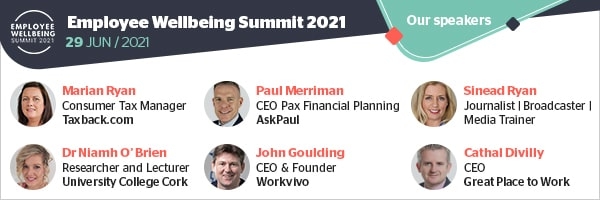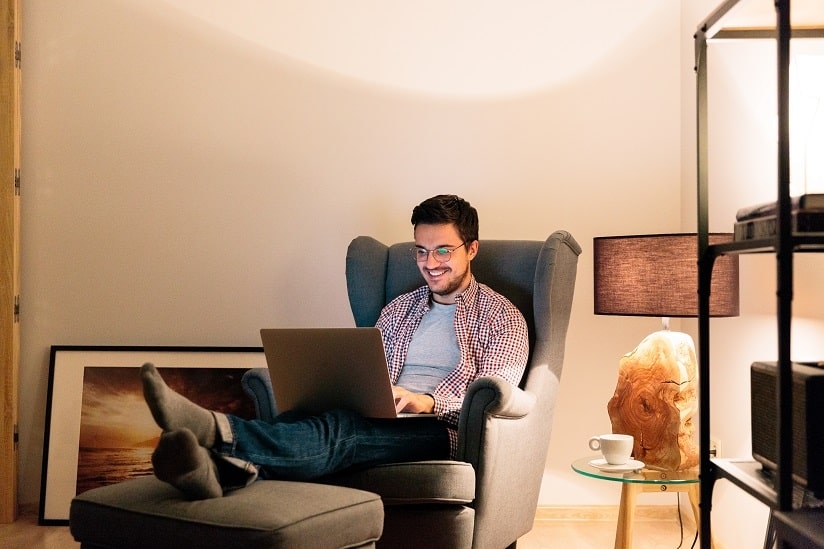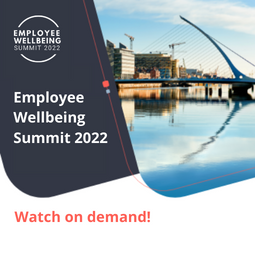4 Ways Your Organisation Can Enhance Employee Wellbeing
In recent years, employee wellbeing has become a very important topic within organisations around Ireland.
Wellbeing at work is all about the affect that our work life – our tasks, stress levels and working environment – has on our overall health and happiness.
But how do you create a culture that puts wellbeing at its heart?
This was one of the key topics discussed at the inaugural Employee Wellbeing Summit.
Our panels discussed the Future of Employee Wellbeing in Ireland. Speakers included:
- Marian Ryan, Consumer Tax Manager of Taxback
- Paul Merriman (aka AskPaul)
- Journalist & Broadcaster, Sinead Ryan
- Dr. Niamh O'Brien, Researcher and Lecturer in University College Cork
- Cathal Divilly, CEO - Great Place to Work
- John Goulding, CEO & Founder – Workvivo

If you missed out on the Summit, you can watch it back at any time here.
Be sure to also check out our blog on the four financial wellbeing takeaways from the Employee Wellbeing Summit.
In this blog, we have summarised the top four workplace wellbeing takeaways from the Employee Wellbeing Summit.
1 – How employers can adapt to the future of working in Ireland
"We need to engage with employees to find the best way of working in the future."
Since the outbreak of COVID-19, we have all had to rethink how we live and work. And Sinead Ryan believes that these changes to our working environment will last longer than the pandemic.
"Working from home is here to stay," says Sinead Ryan. "And it will be fascinating to see how many employers will choose not to go back to the way we were before COVID.
"Many people favour a hybrid approach to work – they would like to spend a few days at home and a few days in the office. In the future, I can see a lot of work being task lead and project-driven - rather than an emphasis being placed on having to clock-in and out by a certain time."

Trust
"I think a sense of trust coming from employers to employees is fundamental going forward," says Dr. Niamh O'Brien, Researcher and Lecturer in University College Cork.
"I think that has been established in many companies and organisations already as a result of the pandemic. This is great because you can see there has been an increase in self-efficacy – a colleague's ability to set up their own working day, to complete a task without being micromanaged, and to do it in an environment that they have built. That will give them a lot of independence and an initiative that I think employers want to see."
"So many workplaces have gone from zero employees working remotely to everyone working remotely," adds Cathal Divilly, CEO - Great Place to Work. "How many hundreds of years would that have taken us to do, had we not been forced to do it! But employers have embraced the challenge.
"But employers should not put too much pressure on themselves in terms of what the solution will be for their workplace. We need to engage with employees to find the best way of working in the future and involve them as much as possible. How you reach that solution is just as important as the solution itself."
Skipping the commute
"We have to recognise that we are dealing with humans and not robots,'' adds Dr. O'Brien. "Before the pandemic, I remember often thinking to myself; 'when am I going to get off this treadmill, this is insane, I am driving around the country for a half an hour meeting and yet I have to be back at an unreasonable time to make the next meeting or deadline'. I think we are learning that it is not sustainable in the end and that we are all going to get burnt out if we try to do that."
Remote working policies
As we transition to a future of hybrid working, many Irish organisations will now be in the process of implementing their own remote working policies.
Businesses must find a solution which works best for both management and staff. The remote working policy must properly define when and how employees can work from locations other than the office or on a flexible schedule.
How to Enhance the Financial Wellbeing of your Employees
2 – Encourage wellbeing practices for employees working from home
"We need to put down our own boundaries, like removing the workplace email app from our phone."
In April, the government signed a new code of practice that entitled all workers to disconnect from their work outside their normal working hours.
While Dr. O'Brien says that this was a very positive development, she also believes that achieving a good work-life balance can be challenging for remote workers.
"I have spoken to a lot of people over the last couple of months and many of them report having high levels of stress. They feel they have no time to shut off where they can close the laptop and attend to the needs of the house or to their children, as they would have done in their pre-pandemic routine."
"A common stressor for many employees is when emails arrive in the evening and night time," adds Divilly. "But often when a CEO or manager is sending an email in the evening, they don't expect to get a response.

"However, that 'ping' sound on the phone that signifies that an email has arrived was causing people a lot of anxiety. It's natural to feel you have to check it.
"There are many solutions employers can implement to try to alleviate this stress. For example, you can automate your email server to delay the delivery of any emails sent in the evening so that they don't arrive until 9am the next morning. This is a simple step that can be taken but it can have a big impact on wellbeing."
"I think our personal boundaries are really important and it is vital to be able to switch off," continues Dr. O'Brien.
"When our phone beeps our sympathetic nervous system is alerted and our parasympathetic nervous system is not allowed to activate. Your sympathetic nervous system keeps you on edge and gives you those sweaty palms and that upset tummy when you're nervous.
"The parasympathetic nervous system kicks in when we have downtime and this allows us to digest our food and to sleep well. If your parasympathetic nervous system isn't given enough time to take hold and to be in control over the sympathetic nervous system, then you're going to be in a constant state of stress.
"So, we need to put down our own boundaries for ourselves, and doing really simple things like removing your workplace email app off your phone, or scheduling your emails are really good ways for you to protect your health."
Boundaries between work and leisure
While no two organisations are the same and differing working arrangements are in place in every business, the right to maintain clear boundaries between work and leisure is in place for every worker.
And the new government rules apply to all types of employment – including staff who work from home.
Therefore, each workplace must implement their own appropriate policies and procedures to ensure that they comply with their statutory obligations and that employees' rights are preserved.
How to Enhance the Financial Wellbeing of your Employees
3 – Fostering a culture of belonging amongst a remote workforce
"We should want our employees to feel and act like owners of the organisation."
John Goulding, CEO & Founder of Workvivo says employers need to do more to ensure there is a sense of togetherness among their colleagues.
"We did a survey of 1,000 people and it found that since the pandemic started, 50% of people feel less belonging within their organisation, which is a real problem. What's more, 60% of people said they feel less connected to the goals of their organisation, which is also very significant.
"Ultimately, we all want to feel part of something bigger and we all want to feel that sense of belonging."
Building a culture of trust is key to achieving that sense of belonging. And there are a number of ways that employers can do this. A good place to start? Effective communication is more important than ever before as employees strive to feel connected and 'in the loop'.
"Trust is built on familiarity, on human authenticity. We have seen CEO's use Workvivo to deliver weekly video updates to their staff. This is not over-produced content; it is just a very human, authentic message of what is going on at that point in time.
"We should want our employees to feel and act like owners of the organisation. And feeling informed is one of the biggest drivers of that sense of ownership. It's not just feeling informed about what's going on today, it's about the bigger things going on in the company."
Divilly says that employers should also look for fun ways to build camaraderie and keep their employees engaged as a team.
"We introduced a zoom team quiz every few weeks and they were great fun. The beauty of them is that we come together, we connect, and we don't talk about work. Work is busy and we have a lot of work to be doing but it is just great to join a call and know that we are not going to be talking about work and we can have a bit of craic. For us that has worked well from a connection point of view."
Ultimately, if organisations are eager to improve their culture and retention of their employees, they must foster a sense of belonging amongst their team.
Research consistently indicates that when employees feel that they belong to a team or organisation, they perform better at work.
Meanwhile, where employees feel that they do not belong, there is an increased risk of burnout and underperformance.
How to Enhance the Financial Wellbeing of your Employees
4 – Why tackling a sedentary lifestyle is important for remote workers
"Workplaces need to promote physical activity in order to protect the health of their employees"
"One of the downsides to working from home is that we are now more sedentary than ever," says Dr. O'Brien.
"For example, we don't have to walk from the bus, train or car to work anymore and that is a major problem.
"Sedentary behaviour has now been equated with smoking and has a detrimental effect on your physical and mental health. This is a problem that employers need to address in order to protect their colleagues.
"I think our workplaces need to promote physical activity and raise awareness for employees in order to protect their health and realise that this is an occupational hazard that needs to be addressed."
"I think that a lot of the meetings that we have could actually be walking meetings," adds Goulding
"The next time you are setting up a call, ask yourself; 'is it something I need to be at my desk for?' If not, you could decide to go out for a walk for that meeting. That's the kind of thing that sparks a bit of creativity also!"
Employers can help their staff to tackle sedentary behaviour by encouraging employees to take 10-15 minute breaks throughout the day for exercise. To take things a step further, why not provide an online yoga or pilates class that staff can join during their lunchtime? Finally, consider organising a CSR day where staff meet and take part in an activity for charity?

Introduce a financial wellbeing initiative into your employee wellbeing programme
It has been proven that mental health and financial security are intrinsically linked.
Supporting the financial wellbeing of your employees will have a positive impact on both your employees and your business.
At Taxback.com, we have developed a financial wellbeing initiative that enables organisations to ehance their employees' financial wellbeing by offering them the support they need to understand their personal financial and tax situation.
Our solution helps to reduce financial stress on PAYE employees as we ensure that they are availing of every tax-saving opportunity that they are entitled to by helping them to claim their Irish tax back.
How it works
Promotion – You let your employees know about our service and encourage them to register
Dedicated landing page – We will create an exclusive landing page which your employees can use to register for their comprehensive four year tax review
Helpful and informative tax content – we will host a customised tax webinar for your staff – outlining everything your team needs to know about their tax entitlements and how they can claim them
Maximum tax refund guaranteed – we manage all of the tax paperwork on behalf of your team and transfer their tax return straight to their bank account
Book a free demonstration
If you would like to learn more about our Financial Wellbeing Service, why not book a free demonstration today?






